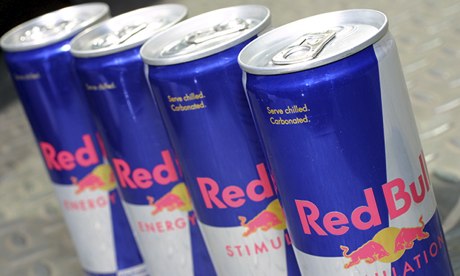
Morrisons has become the first UK supermarket chain to ban sales of popular high-caffeine energy drinks to children, amid growing concern about the impact of excessive consumption on child health.
In a pilot which may be rolled out nationally next year, Morrisons checkout staff have been instructed to challenge younger shoppers to prove that they are over 16 before allowing them to buy the soft drinks with the highest caffeine content, including market leader Red Bull.
The move is in line with the British Soft Drinks Association's code of practice and guidance from the government's Food Standards Agency, which specifies that children should only consume caffeine in moderation.
The code specifies that products containing more than 150mg caffeine per litre must carry the warning: "Not suitable for children, pregnant women and persons sensitive to caffeine."
Morrisons is the fourth largest UK supermarket, with 570 stores. It is currently trialling the ban in stores in Glasgow, Dorset, Leeds, Cheshire, Staffordshire and Suffolk, with a view to rolling it out further – if successful – next year.
Energy drinks are defined as those with high caffeine levels that are claimed by the manufacturers to give the consumer more energy than a typical soft drink.
The ban by Morrisons applies to products with more than 150mg of caffeine per litre. That includes major brands such as Red Bull which has 320mg, Monster with 338mg and Relentless with 320mg.
Guy Mason, head of corporate affairs at Morrisons, said: "We have become increasingly aware of the concerns of politicians, teachers and parents about the potential impact of high-caffeine energy drinks on young people.
"We decided to take a leadership position by running a limited trial across the UK, banning the sale of such drinks to under-16s and giving us the opportunity to listen to the feedback of customers, young and old."
Mason admitted that there were practical problems in enforcing the ban, however, and went on: "This is still very much a trial. We know that some of our younger customers are having difficulty proving they are 16, and we will have to take this into account when we make our decision in the new year on whether or not to roll this out."
Energy drinks contain high levels of caffeine, usually about 80mg of caffeine in a small 250ml can – the same as three cans of cola or a mug of instant coffee.
But some of the stronger and smaller "shot style" products can contain anywhere from 80mg to as much as 175mg of caffeine in a 60ml bottle. As well as caffeine, they may contain high levels of sugar and herbal stimulants.
Red Bull is now the UK's third bestselling soft drink, after Pepsi and Coca-Cola.
Studies have shown that children who consume moderate amounts of caffeine before physical activity can have elevated blood pressure, while in extreme cases – involving adults – excessive consumption has led to death.
Teachers' leaders and health professionals have expressed concerns about youngsters relying on the drinks – even to start the day as a substitute for breakfast or in a packed lunch.
A recent survey by the Make Mine Milk campaign revealed that one in 20 teenage pupils regularly goes to school on a can of energy drink instead of tucking into a good breakfast.
Chef Jamie Oliver, who has campaigned for higher standards of school meals as well as scrutinising packed lunches, has criticised high-energy drinks as a routine option for children and famously said on the subject: "I challenge you, to go to any school and open 50 lunchboxes, and I guarantee you there will be one or two cans of Red Bull, there'll be cold McDonald's and jam sandwiches with several cakes."
• This article was amended on 25 November 2013 to remove some incorrect figures for Red Bull sales.

